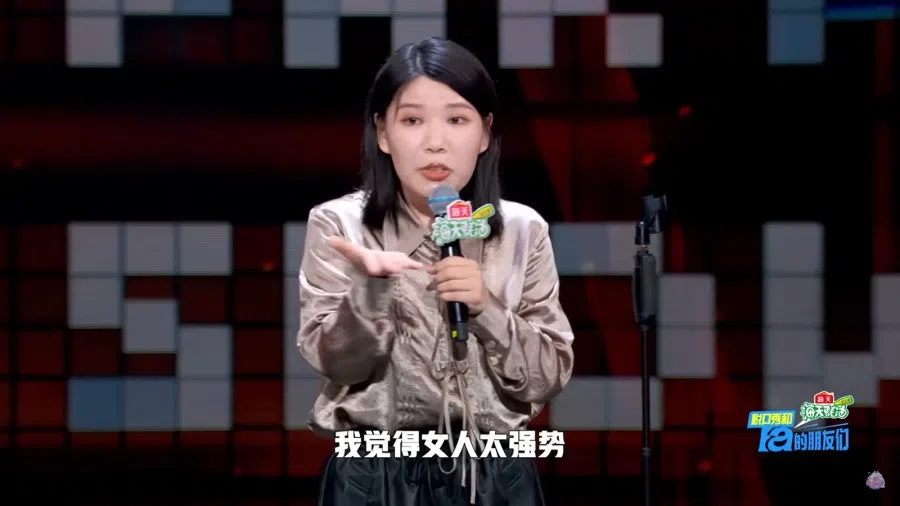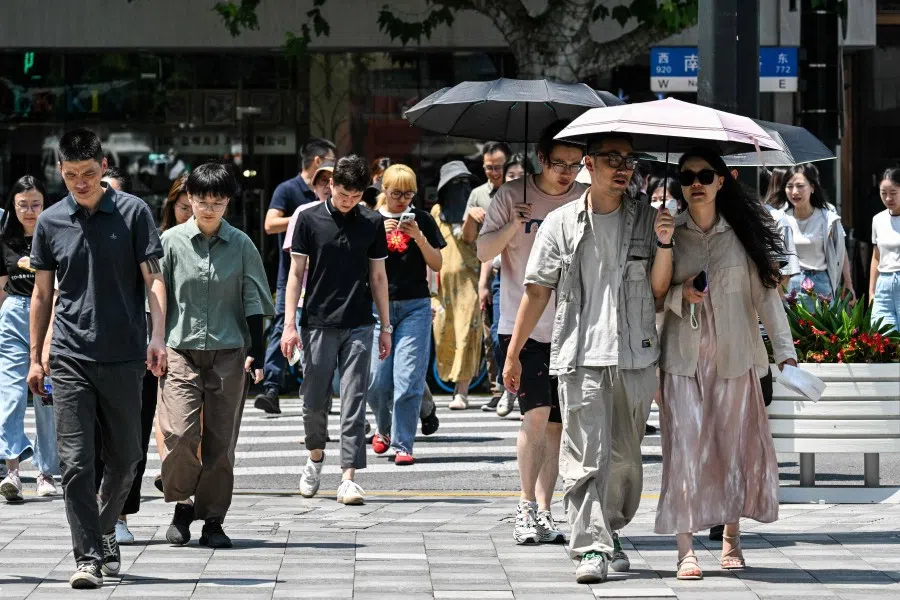China’s female comedians: Are men really listening?
China’s female comedians are firing up this year’s stand-up comedy stage with pointed and harsh truths about gender inequality. However, Lianhe Zaobao correspondent Li Kang asks, despite these women’s louder voices, are the men or society really listening?

The annual stand-up comedy season is upon us again, and female comedians are rising up this year.
A former flight attendant with an athletic background, “Hip-Hop” takes the stage in a baggy T-shirt to challenge the stereotypical image of flight attendants, while sharply criticising airlines’ requirement to wear pantyhose.
From pantyhose to divorce
Cai Cai, who sparked discussion with her “period shame” performance last year, has turned her attention to lingerie, denouncing underwire bras as a form of physical and mental oppression for women.
Zhang Hui, nicknamed “Smoke Detector”, targets secondhand smoke in public spaces. Similarly, Shan He, also criticising public environments, highlights the unsanitary conditions of public toilet seats, describing the awkward dilemma many women face regarding whether to sit or squat.
With two daughters in tow, she ended a 30-year arranged marriage. Today, Fang has the confidence to support her daughters in making different choices from her own.

Wang Xiaoli, 45, has made “single and childless” her calling card. She boldly challenges societal expectations, declaring that there’s nothing wrong with a life without marriage. She said, “In the past, just to fit in, I had to make up a husband, make up kids, make up worries — but so what if I don’t fit in?”
“Chief Fang”, 50-year-old head of the village information centre in Linyi, Shandong, gave the public a rare glimpse into the voices of rural women. Faced with an abusive, unfaithful and financially irresponsible husband, her parents simply pressured her to endure it, telling her, “You know, tough times always pass.”
It wasn’t until she stood on the stand-up stage that she finally began to hear her own voice. With two daughters in tow, she ended a 30-year arranged marriage. Today, Fang has the confidence to support her daughters in making different choices from her own. “If my daughter gets married one day and comes home saying, ‘Mum, he…’, I’ll say to her, ‘Divorce him!’” she remarked.
But it wasn’t until she grew up that she realised her father wasn’t the only one who was so forgiving to men. “The entire society is just like my dad,” she quipped.
While Fang walked out of her marriage, a young woman from Xinjiang named Xiao Pa boarded a slow green train to flee from her oppressive, controlling household. She joked about her father’s six marriages, asking his sixth wife, “Why did you marry my dad? He’s bad-tempered, a heavy drinker, doesn’t do housework, abusive…”

Xiao Pa also pointed out her father’s absurd tolerance and favouritism towards boys, noting he could let sons get away with murder. But it wasn’t until she grew up that she realised her father wasn’t the only one who was so forgiving to men. “The entire society is just like my dad,” she quipped.
More support for female comedians
In the early days when female stand-up comedians became popular in China, many of them addressed gender issues. Zhao Xiaohui spoke about women’s struggles in the workplace, Bird Bird used self-deprecating humour to dismantle beauty anxiety, and Yang Li coined the iconic line: “So average, yet so confident.” However, judging from the ferocious backlash Yang Li faced in the past, it is clear that challenging gender norms on stage was once a tough and risky endeavour for women.
But this year, female comedians are taking the stand-up stage with a noticeably sharper edge — marked by greater confrontation, confidence and defiance. Unlike in the past, they are not encountering the kind of backlash that Yang Li once faced. Instead, there has been a clear uptick in online support and understanding for their voices.
Female comedians, by speaking more boldly and breaking taboos, are increasingly challenging China’s traditional gender norms and power structures. Of course, confronting a male-dominated social order does not come without resistance.

For example, in the case of a female university student in Dalian who was accused of “damaging national dignity” for having a one-night stand with a foreign man, it was clear that male voices continued to dominate the public discourse, with outrage and condemnation directed squarely at the young woman.
In recent years, this clash of forces has manifested as an increasingly sharp gender divide — another significant trend in contemporary Chinese society alongside the phenomena of “lying flat” and “involution”.
The growing economic power of Chinese women has laid the foundation for both the rise of female singleness and what some call a “women’s exodus”.
Women are speaking up, but who’s listening?
One indirect consequence of this polarisation is the rising number of single women in China. Marriage rates have continued to fall, while divorce rates remain high. According to rough official estimates, last year there were 6.1 million new marriages and 2.62 million divorces in China — pushing the divorce rate close to 43%.
The growing economic power of Chinese women has laid the foundation for both the rise of female singleness and what some call a “women’s exodus”. A 2023 McKinsey report showed that China has the largest number of working women in the world, with a female employment rate of 44.8%, higher than the global average of 39.3%, and on par with developed Western countries such as the US and Sweden.
The rise in women’s social status brought about by greater economic independence is increasingly visible and tangible in China’s major cities.

Take Shanghai, for example. It is common for men to take on household chores such as grocery shopping, cooking and dishwashing. The image of the “Shanghai man” as a devoted family man is deeply rooted in the public consciousness. At the same time, bars, gyms and bookstores catering exclusively to women are on the rise. And female stand-up comedians receiving thunderous applause for openly expressing their misandrist sentiments gives the misconception that Chinese women now “hold up half the sky” — perhaps even to the extent of marginalising men.
While anti-male sentiment may appear fierce among certain groups of women today, it remains a largely ineffective form of resistance against deeply entrenched social norms.
However, when the lens shifts to small towns, rural areas and remote regions, a very different picture emerges. Many women are still confined to traditional roles, with marriage becoming a form of bondage. It is all too common for women to toil like a beast of burden after getting married. It has only been three years since the “chained woman” case came to light, and the harsh reality faced by such women remains far more representative of the broader condition.
While anti-male sentiment may appear fierce among certain groups of women today, it remains a largely ineffective form of resistance against deeply entrenched social norms. To shake thousands of years of patriarchal tradition would require much louder, sharper voices. But then again — how many men are truly listening?
This article was first published in Lianhe Zaobao as “集体出走的中国脱口秀女演员”.





